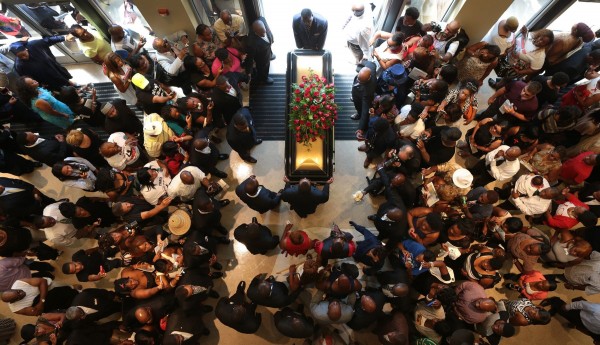The Civil Rights Battle In Ferguson
August 28, 2014

If the death of Michael Brown has taught us anything, it’s that a year after the acquittal of George Zimmerman for Trayvon Martin’s murder, people can no longer sit and watch as institutionally approved racial profiling is committed on a daily basis by those put in place to protect and serve.
On Saturday, Aug. 9, Darren Wilson, a white police officer, asked Michael Brown, an unarmed black teenager, to stop walking in the street. Brown was then shot six times by Wilson, who has yet to release a statement explaining his reason for shooting.
There has been mass protesting in Ferguson, Missouri by blacks and whites alike, which has been met consistently by an overly militarized police force. On Tuesday, Aug. 19, the St. Louis police department shot Kajieme Powell, a 25-year-old black man, for brandishing a knife, killing him only four miles from the ongoing protests. It’s becoming clear that the police are totally out of their depth in a situation created by their own officers, and reform is severely needed. Though protests cannot single-handedly eradicate racism, they can raise awareness and begin the process of creating legislation to help communities suffering from discrimination.
In the most direct sense, this outcry is a product of police brutality in Ferguson, which has continued throughout the protests and turned Ferguson into a war zone unseen in the United States since the treatment of Civil Rights protesters in the Jim Crow South. To 21st century, “post-racial” American eyes, this treatment is beyond shocking. The constant murder of young black men at the hands of police is nothing new for the U.S., but the way that Ferguson police responded to the totally valid distress of their citizens communicated clearly that they saw no issue with their actions.
The protests, which usually start out peacefully, have at times turned violent, with small factions of protestors lashing out with looting and (reportedly) Molotov cocktails. As a result, Missouri Governor Jay Nixon instated a curfew, citing the violence of select looters as reasoning for punishing all. This continues a pattern of placing blame on civilians. In fact, the Ferguson police department launched a smear campaign against the victim, suggesting that Brown had been taped on security cameras robbing and threatening a corner shop owner (as if petty theft ever gets the death penalty). Within a week they admitted that Wilson had no prior knowledge that Brown could have been involved in a robbery. The police department has also insinuated that Brown attacked Wilson, instigating his shooting. However, no eyewitness to the shooting corroborates that story, and Wilson, hidden from the press since day one, has yet to release a statement.
Authorities have not only attacked the protests in a physical sense, but they have also attacked freedom of speech. On Monday, Aug. 18, Chris Hayes, host of MSNBC’s All In, was threatened by a police officer for taping. On Thursday, Aug. 14, journalists Ryan Reilly and Wesley Lowery (from the Huffington Post and Washington Post, respectively) were arrested for “trespassing”— as they worked on their articles in a McDonald’s. They were released 45 minutes later, but the message sent out by the police force was clear: you do not have the right to document this.
The common theme of these developments has been the abuse of power by the police, and the continued loss of rights for protesters and journalists, peaceful and violent alike. This situation needs to change immediately. Two lives have been lost and we cannot afford to lose any more. The police department should recant their release of the video of the “robbery” and release a statement by Wilson, if they’re convinced of his innocence. The indiscriminate use of rubber bullets and tear gas should be stopped; instead, the police should specifically target those who are behaving violently. Doing so would protect peaceful protestors instead of criminalizing them.
On a bigger scale, we need a total reform of our police system, a removal of funding for SWAT-level police forces, and to pass the Mike Brown Bill, forcing all policemen to wear cameras. We need to address institutionalized racism, which has contributed to racial profiling, not to mention the clogging of our prison systems created by the very same racist police force oppressing the citizens of Ferguson. The police needs to begin listening to the protests instead of simply crushing them, or else history will continue repeating itself. The protesters in Ferguson are just ready for a change.









